Basic Tenets of Buddhism
Buddha was a list maker (or bullet-point maker). He lived before paper was invented, so out of necessity his teachings were passed on through spoken teachings and memory. And we all know it’s easier to memorize items in short lists than long stories. So Buddha made lots of lists to distill and transmit his wisdom. The lists on the following pages itemize the basic tenets that Buddha taught. There are numerous online resources that offer detailed discussion of these teachings, if you wish to delve deeper. I have included links to some sites which are excellent sources for further investigation into Buddhism.
Note that Buddha’s native language was Pali and English translations often fail to express the original intent of the Pali word. I have included clarification where appropriate.
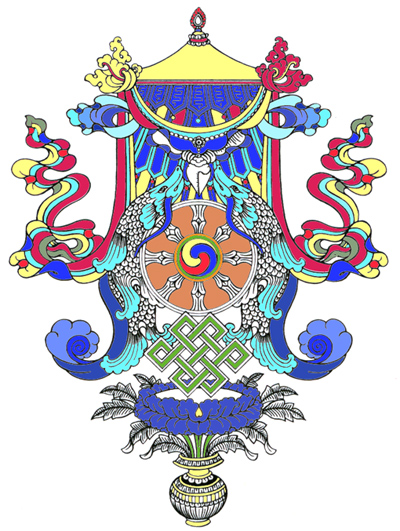
4 Seals of Buddha’s Teachings*
1. Compound phenomena are impermanent1
2. All stained emotions are painful2
3. All phenomena are empty3
4. Nibbana* is the emptiness / extinction of all Dukkha4
* The 4 Seals are probably the most misunderstood of all Buddha’s teachings.
1 - Anything that is assembled will, sooner or later, come apart.
2 - Buddhists consider emotion a compound phenomena and all emotions are dualistic & dependent on your mind: dualism means emotions are impermanent since even great happiness fades to be replaced by a different emotion (e.g., boredom).
3 - Empty means without having inherent existence, since we perceive all phenomena by our mind and with meaning interpreted through our emotions - our perception of an object is dependent upon how we feel at any given moment: sad, angry, happy, cheerful, fearful.
4 - Nibbāna is the state one attains by extinguishing all fires of craving and attachment (raga), aversion (dvesha) and ignorance (moha or avidya) and is no longer entangled by craving that which one cannot have, thus releasing the bonds of dualistic thinking of dukkha. Nibbana is the Pali word for Nirvana
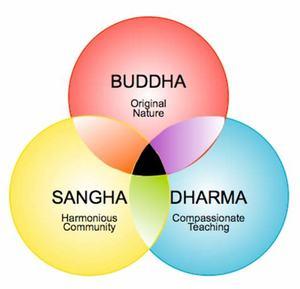
3 Jewels of Refuge*
Buddha (the teacher)
Dharma (the teachings)
Sangha (the Buddhist community)
* Follow this URL for more information the 3 Jewels of Refuge
4 Noble Truths*
Dukkha exists (aka: suffering**) - because all things are impermanent
Dukkha is caused by craving - because craving is a painful, unfulfilling emotion
Craving can be stopped - if we accept that there is nothing permanent
Practice the Eight-fold path to stop craving - because it provides a tool to extinguish Dukkha
* Each of the 4 Noble Truths is directly tied to each of the 4 Seals of Buddha's teachings listed above.
** Dukkha, often translated as suffering, is better understood being as unhappy or dissatisfied with something in your life and craving it were different. This could be feeling jealousy for what another may have, craving something that you do not have, or being in great physical or emotional pain and being unable to accept it as a condition of ones life in the present moment.
8-Fold Path 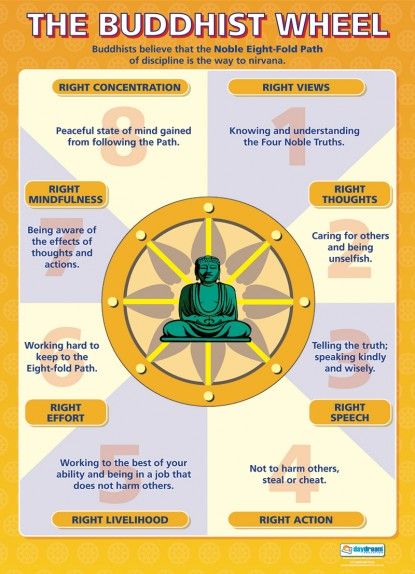
Right view
Right intention
Right speech
Right action
Right livelihood
Right effort
Right mindfulness
Right concentration
3 Higher Trainings
Morality
Concentration
Wisdom
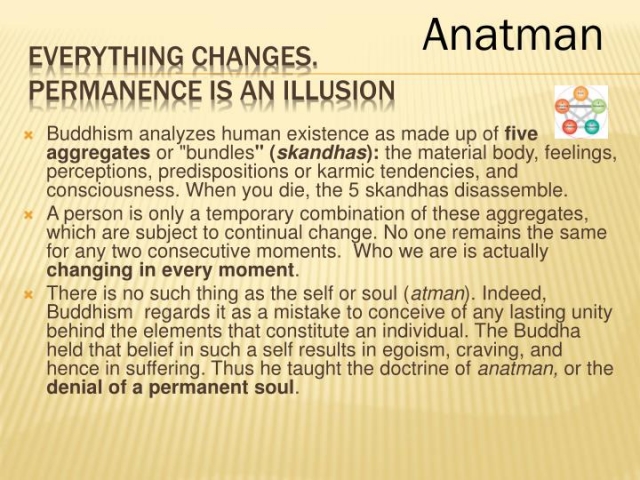
5 Aggregates (Skandhas)
Form
Feeling
Recognition
Mental formations
Consciousness
5 Powers
Saddha (Trust in the Practice)
Effort/Energy
Mindfulness
Concentration 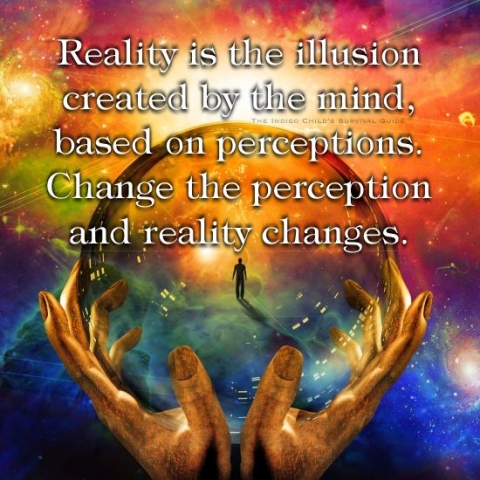
Wisdom
4 Reliances
Rely on the dharma, not the teacher
Rely on the meaning, not the words
Rely on explicit meanings, not implicit meanings
Rely on wisdom, not on consciousness
7 Factors of Enlightenment
Mindfulness 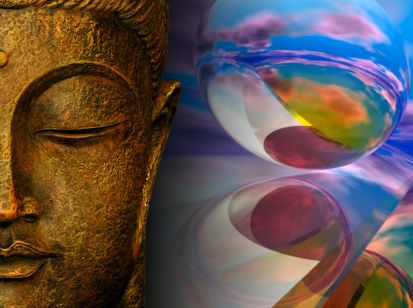
Investigation
Energy
Happiness
Tranquility
Concentration
Equanimity
10 Perfections (from Theravada school)
Generosity 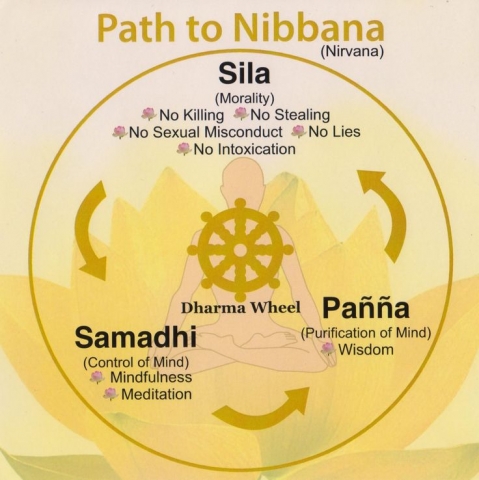
Moral discipline
Patience
Effort
Meditative concentration
Wisdom
Renunciation
Truthfulness
Loving-kindness
Equanimity
10 Non-Virtuous Actions & Wheel of Life
The Wheel of Life describes the cause of all evil and its effects, mirrored in earthly phenomena just as it is experienced by every person from the cradle to the grave. Picture by picture it reminds us that everyone is always his or her own judge responsible for their own fate, because our actions and their effects are the fruits of one's own deeds. This so-called fate is demonstrated by the Lord of Dead, who like a monster holds the Wheel of Life in his claws; he is a symbol of the transitory nature of all earthly phenomena. This list contains the ten non-virtuous actions which Buddhists vow to avoid or eliminate from their life.
Personal bodily harm 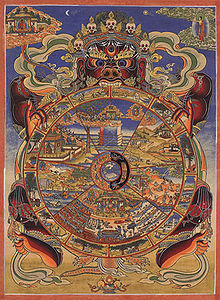
Killing
Stealing
Sexual misconduct
False speech
Lying
Divisive speech
Harsh speech
Idle gossip
Mindlessness
Craving
Aversion
Delusion
The image at right is called Bhavachakra and is a Tibetan Buddhist representation of the "wheel of life," or cycle of existence. (posted by MarenYumi/Flickr). The following URL links to a web page by Barbara O'Brien which provides a detailed description of each of the multiple components of the Wheel of Life.
12 Links of Dependent Arising
The Wheel of Life represents the Buddhist teaching that nothing in the universe can arise and stand independent by itself. To exist, everything and everyone in the universe depends upon innumerable interrelated elements and events. You could not exist without food and water, a mother, father and innumerable ancestors, air to breathe, other people who plant, grow, harvest, pack, ship, deliver, and sell the food you eat, manufacture the goods you use, and deliver the services your use on a daily basis. Even if you moved into the wilderness, grew/hunted all you own food, built your own dwelling, hauled your own water, and were able to make all of you own tools and clothing, you would still be dependent upon the animals, seeds from plants to grow your crops, streams, raw materials, and the accumulated knowledge of people and objects outside of yourself.
Ignorance
Mental formations 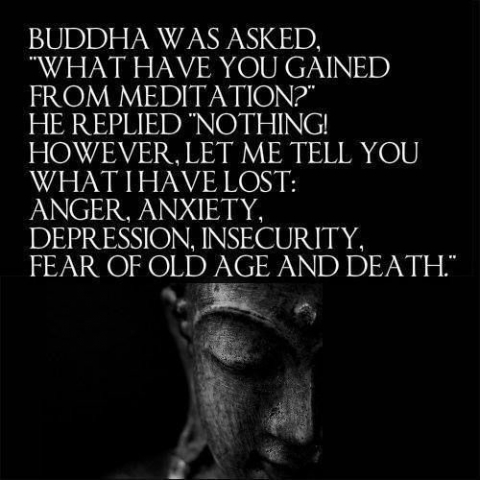
Consciousness
Name and form
Six Senses
Contact
Feeling
Craving
Grasping
Becoming
Birth
Aging and death
10 Basic Beliefs & Understandings of Buddhism
Everyone would like to lead a happier life, but few know what that would mean or how to accomplish it.
Our emotions and attitudes affect how we feel. With training, we can rid ourselves of negative ones and develop those that are healthier and more positive. Doing that will make our lives happier and more fulfilling.
Disturbing emotions such as anger, fear, greed and attachment make us lose peace of mind and self-control.
With training, we can free ourselves from being under their control.
Acting compulsively out of anger or greed creates problems for us and leads to unhappiness. With training, we can learn to calm down, think clearly and act wisely.
Positive emotions such as love, compassion, patience and understanding help us remain calm, open and clear, and bring us more happiness. With training, we can learn to develop them.
Self-centered, selfish behavior and thought close us off from others and make us unhappy. With training, we can overcome them.
Realizing that we are all interconnected and that our survival depends on each other opens our hearts and minds, helps us develop concern for others, and brings us more happiness.
Most of what we perceive in ourselves and in others are projections of fantasy, based on confusion. When we believe that our projections correspond to reality, we create problems for ourselves and others. With correct understanding, we can rid ourselves of confusion and see reality. This enables us to deal calmly and wisely with whatever happens in life.
Working on ourselves to become a better person is a life-long challenge, but the most meaningful thing we can do with our lives.
The Fourteen Precepts of Engaged Buddhism
The Order of Interbeing (Tiep Hien) was formed by the Vietnamese monk Thich Nhat Hanh in the mid-1960’s, at a time when the Vietnam War was escalating and the teachings of the Buddha were desperately needed to combat the hatred, violence, and divisiveness enveloping his country.
On the full moon day of February 1966, Zen Master Nhat Hanh ordained six members into the Order—three men and three women ranging in age from twenty-two to thirty-two. All were board members of the School of Youth for Social Service, which he had helped found the year before. During the ceremony, the six ordainees vowed to study, practice, and observe the Fourteen Precepts of the Order of Interbeing, a wonderful blend of traditional Buddhist morality and contemporary social concerns.
For ten years, no new members were permitted to join the Order’s core community. In fact, this “period of experimentation” was extended until 1981, when Nguyen Anh Huong, a microbiologist and lay meditation teacher, became the seventh member of the Order.
Today, there are thousands worldwide who regularly recite the Fourteen Precepts of Engaged Buddhism, which remain uniquely applicable to contemporary moral dilemmas. They are guidelines for anyone wishing to live mindfully. By developing peace and serenity through ethical and conscientious living, we can help our society make the transition from one based on greed and consumerism to one in which thoughtfulness and compassionate action are of the deepest value.
—Fred Eppsteiner
The Fourteen Precepts of Engaged Buddhism
-
Do not be idolatrous about or bound to any doctrine, theory, or ideology, even Buddhist ones. Buddhist systems of thought are guiding means; they are not absolute truth.
-
Do not think the knowledge you presently possess is changeless, absolute truth. Avoid being narrow-minded and bound to present views. Learn and practice nonattachment from views in order to be open to receive others’ viewpoints. Truth is found in life and not merely in conceptual knowledge. Be ready to learn throughout your entire life and to observe reality in yourself and in the world at all times.
-
Do not force others, including children, by any means whatsoever, to adopt your views, whether by authority, threat, money, propaganda, or even education. However, through compassionate dialogue, help others renounce fanaticism and narrowness.
-
Do not avoid contact with suffering or close your eyes before suffering. Do not lose awareness of the existence of suffering in the life of the world. Find ways to be with those who are suffering, including personal contact, visits, images, and sounds. By such means, awaken yourself and others to the reality of suffering in the world.
-
Do not accumulate wealth while millions are hungry. Do not take as the aim of your life Fame, profit, wealth, or sensual pleasure. Live simply and share time, energy, and material resources with those who are in need.
-
Do not maintain anger or hatred. Learn to penetrate and transform them when they are still seeds in your consciousness. As soon as they arise, turn your attention to your breath in order to see and understand the nature of your hatred.
-
Do not lose yourself in dispersion and in your surroundings. Practice mindful breathing to come back to what is happening in the present moment. Be in touch with what is wondrous, refreshing, and healing both inside and around you. Plant seeds of joy, peace, and understanding in yourself in order to facilitate the work of transformation in the depths of your consciousness.
-
Do not utter words that can create discord and cause the community to break. Make every effort to reconcile and resolve all conflicts, however small.
-
Do not say untruthful things for the sake of personal interest or to impress people. Do not utter words that cause division and hatred. Do not spread news that you do not know to be certain. Do not criticize or condemn things of which you are not sure. Always speak truthfully and constructively. Have the courage to speak out about situations of injustice, even when doing so may threaten your own safety.
-
Do not use the Buddhist community for personal gain or profit, or transform your community into a political party. A religious community, however, should take a clear stand against oppression and injustice and should strive to change the situation without engaging in partisan conflicts.
-
Do not live with a vocation that is harmful to humans and nature. Do not invest in companies that deprive others of their chance to live. Select a vocation that helps realize your ideal of compassion.
-
Do not kill. Do not let others kill. Find whatever means possible to protect life and prevent war.
-
Possess nothing that should belong to others. Respect the property of others, but prevent others from profiting from human suffering or the suffering of other species on Earth.
-
Do not mistreat your body. Learn to handle it with respect. Do not look on your body as only an instrument. Preserve vital energies (sexual, breath, spirit) for the realization of the Way. (For brothers and sisters who are not monks and nuns:) Sexual expression should not take place without love and commitment. In sexual relationships, be aware of future suffering that may be caused. To preserve the happiness of others, respect the rights and commitments of others. Be fully aware of the responsibility of bringing new lives into the world. Meditate on the world into which you are bringing new beings.
From “Interbeing: Fourteen Guidelines for Engaged Buddhism,” Revised edition: Oct. 1993 by Thich Nhat Hanh, published by Parallax Press, Berkeley, California.

